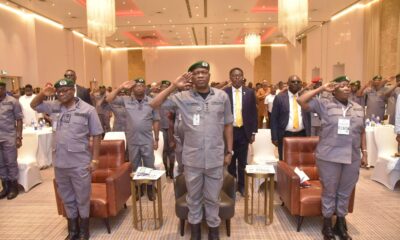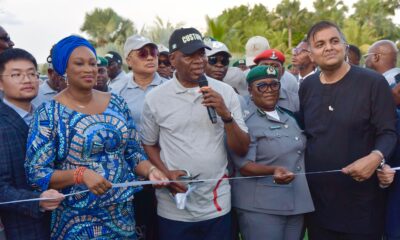Customs Report
Frank Onyeka: The Journey So Far

BY EGUONO ODJEGBA
Appointed the Customs Area Controller in December 2024, Comptroller Frank Okechukwu Onyeka has put in half a year at the Tin Can Island Port, Nigeria’s second biggest customs port; handling assortments of imported cargo traffic.
Whereas to the ordinary onlooker, this port is no more than a mere bustling environment for trading activities, where importers and their clearing agents engage in clearance documentations, making of payments of statutory taxes and fees, and where government revenue receipts are scrutinized, verified and confirmed before cargoes are allowed to exit: benchmarked against prevailing valuation and classification system.
Beneath the maze of official intercourse between declarations and submissions, sorting and verifications, there also sets in, a rather inexplicable and convoluted human machinery in the masking of appropriate entries and true declarations that upsets the integrity of most of the documentations, entries and paper works.
These flurry of activities and the tweaking explained in simple terms, indicates that it’s either cargo have been lost or actual revenue payable on some of the goods have been lost by more than half the net sums. Beyond the monetary and economic concerns, some highly controlled, partially restricted and or outright prohibited items; some of which poses national security risk and safety consumption concerns may have also exited the port; clearly undermining government efforts to stem the smuggling and trafficking of such items.
Above scenario gives the Tin Can port a sort of war environment in an off and on dimension; and based on the efficiency of policing and enforcement which is often opened to attack and possible infiltration.
That was the war Onyeka inherited, a war that was frontally prosecuted and won in significant measure by his predecessor, Comptroller Dera Nnadi mni, to the discomfiture of the smuggling underworld and the applause of the management and leadership of the Nigeria Customs Service.
Like every smuggling syndicate around the world, the deployment of Nnadi to the headquarters upon his appointment as Assistant Comptroller General of Customs naturally created an opening for the dark figures to seek to break the strong security fences already in place; for which Onyeka was expected to double up, close gaps and retake control.
Events have since proven that Onyeka not only did gallantly but has without further ado, also taken steps to rejig some of the strategies to adapt to his leadership style, all of which were aimed at sustaining the successes he met on ground; and expanding the command’s monitoring and enforcement efficiency while building more capacities.
Perhaps, only pretenders would plead ignorant of the successes he has recorded in the past six months; successes that cuts across every operational area and scale of measurement. While this truism appears simplistic, they were certainly not achieved on a platter of gold.
Comptroller Onyeka like his immediate predecessors fought rough, reportedly fought privately and publicly, and fought in dignified yet unsparing manner to achieve whatever gains he has made. Those familiar with the system attests to the fact that he has so far been focused, determined, unrelenting and unprepared to negotiate.
In the same way, he is said to have been quite amenable to purposeful dialogue, engagements and partnership: borrowing from the stance and wealth of experience of his boss, the Comptroller General of Customs, Bashir Adewale Adeniyi MFR.
A man that is true to himself, he publicly admitted that by far his greatest motivation was the fact that the CGC Adeniyi believed in him, believed in his capacity to deliver and proceeded to appoint him as Acting Controller even with a deputy comptroller rank.
Industry watchers believe that his track records, his competence and sagacity also no doubt, played critical factor in his selection and appointment. Rolling up his sleeves, he entered into the ring and straight away confronted what he regarded as the greatest challenges, the issue of multiple alerts in an effort to begin the closing of gaps from within. Closely linked to that was the battle to stem indiscriminate releases and exit of containers.
While addressing select groups of maritime reporters recently, he said he has succeeded in addressing the challenges of multiple alerts and indiscriminate picking of containers through productive, regular engagements and interaction with critical stakeholders, including the media on the need to push out to the general public accurate reports of happenings.
Top on his engagement with stakeholders is dialogue with customs clearing agents, freight forwarders and logistics providers, sister government agencies operating at the port and others connected with the overall security of the port system and economy; and it is believed that no stakeholder has been left out.
It also goes without saying that Onyeka’s capacity to communicate and collaborate as at when due has continued to support his success growth, and helped him to remain on top of his game, through the utilization of qualified contributions, constructive inputs, evaluation of complaints and the aggregate assessments of his performance by all stakeholders; as his mirror.
In the past six months, much has been said and reported about his leadership dexterity and political sagacity in attending to issues and effectively bridging the distance in matters of mutual trust, collaboration and understanding for all stakeholders to key into the policy thrust of the federal government; and support the growth of the national economy.
To this end, he has within the past six months reinvigorated port trade compliance, secured improved, transparent cargo declarations, improved in-house system administration, gained stakeholders confidence, and has redefined operational dynamics aimed at achieving increased performance and productivity.
An administrator with a focus, Onyeka also took early steps to rebrand the command’s bonded terminals to make them more responsive, transparent, smart and efficient; all in a bid to ensure any obstacle on the path of trade facilitation is dismantled.
Apparently aware of decades of the antics of some unscrupulous importers and other stakeholders who try to maximize profit while circumventing laid down trade rules, the Tin Can customs boss embarked on strategies at finding a redress; understandably, this was not without ruffling some feathers.
At a recent meeting members of the League of Maritime Editors (LOME) who paid him a courtesy visit, Onyeka said his target is to achieve the much desired compliance to trade regulations by importers and their freight forwarders.
He believes that trade compliance will lead to increased revenue and reduced smuggling activities. He also strongly believes that he and his management team will enthrone an era of trade compliance without choking trade. Onyeka describes both as parallel to one another, adding that the gulf which separates them cannot be bridged.
As part of the moves to ensure sanity in the system, Onyeka wasted no time in wielding the big stick at the bonded terminals, just so to ensure that the rules of the game are not abused based on a history of sharp practices. This is also to ensure a reinforced coordination of the activities of the terminals under his watch. The move may not be unconnected with speculations that some of the bonded terminals have a history of serving as conduit pipe through which revenue to the government is lost; and to ensure that those involved do not take advantage of the recent change in leadership to return to their old ways.
Onyeka says the Command is therefore taking stern measures to ensure it meets its revenue target of about N1.5trillion for the current fiscal year. Besides the revenue question, Onyeka wants to ensure that bonded terminals are not used for illegal operations, emphasizing that he is determined to address the challenges of sharp practices at the bonded terminals.
This is even as he told the maritime editors and publishers that some of the sharp practices in the bonded terminals have been dismantled through increased scrutiny on goods on bonds or transires containers. He added that the measure includes checks on increased volume of transfer of consignments from the mother port to external bonded terminals.

Some of the transfers in the past had been suspected to be for illegitimate purposes, a development believed to have impacted negatively on appropriate revenue collection. But the Controller disclosed that so far some of such unwholesome activities have been able to curtailed.
He disclosed that most documents are now treated at the mother port with the consignments no longer allowed to go to bonded terminals except they are fully utilised. He further explained that part of the stern measures in place is to ensure that he does not sign any document he is not sure of its authenticity, insisting that terminal operators will not be allowed to serve as weak links in the command’s operations under his watch.
His words: “We take into cognisance national security, trade facilitation and so on. Once your consignment is the same with your declaration after examination is made, your goods get released. Our officers are at different places monitoring. We equally carry out strong sensitization on customs clearing agents. The implication is that unscrupulous bonded terminal operators and their customs agents are no longer able to swindle the country or have a field day.
“The service is more than before determined to facilitate trade, this will be done without choking the business community as well as ensuring that we do not under-charge on duties.
“Let me say that before l came, TICT was not completely public, but as far as we are concerned we have improved on that and l can tell you for free and this is verifiable, that TICT is more active than ever before. This is because l insisted that the rules of engagement should reflect trade facilitation and utmost governance system that promotes balance and fairness.”
On compliance, Onyeka said: “The service is more than before determined to facilitate trade, this will be done without choking the business community as well as ensuring that we do not under-charge on duties.
“We are very sensitive to trade facilitation, we try to sensitize the business community, encourage them and ensure we generate collectible revenue. As valuation officers, we will never under charge and we are not here to choke importers. If we don’t apply the decency, it will be difficult to achieve trade facilitation which is one of our core mandates”, he said.
According to him, his sensitization efforts on compliance have effectively capped smuggling at the port at zero-level, stressing that going by his fairly long operational experiences at the seaport, he has all it takes to challenge any form of sharp practices; even as he declared that no smuggling can successfully pull through under my watch.
On enforcement, the Controller assured that he will do everything to check this trend. It is on record that different items, including drugs, illegal arms and other items worth billions of naira have been seized at the port.
“We are very sensitive to trade facilitation, we try to sensitize the business community, encourage them and ensure we generate collectible revenue. As valuation officers, we will never under charge and we are not here to choke importers.
“If we don’t apply the decency, it will be difficult to achieve trade facilitation which is one of our core mandates”, he said.
As a testament to his impressive performance, the command under his watch in May this year successfully processed its first Single Goods Declaration (SGD) using the indigenously developed B’Odogwu platform, which marked a significant step in trade facilitation and operational efficiency.
He explained that the successful deployment and processing of the inaugural SGD on the B’Odogwu platform reflect the Customs Service’s ongoing commitment to digital transformation, in line with the Federal Government’s drive to enhance ease of doing business.
Speaking on the development, he said: “This achievement demonstrates our readiness to embrace technology that streamlines cargo clearance procedures, reduces dwell time, and improve service delivery. The B’Odogwu platform has shown great promise, and we are proud to be pioneers in its implementation.”
Comptroller Onyeka further also disclosed that the Command has achieved 100% network infrastructure coverage across all its terminals and within the headquarters. This is even as he declared that the problem of network failure is now a thing of the past, ensuring seamless connectivity and efficient processing of cargo and trade documentation.
His commitment to achieve the successful implementation of B’Odogwu at the nation’s second largest seaport reflects the various measures undertaken to ensure that the Service projection remains on a positive trajectory.
Overall, Onyeka has been a strong elixir in helping to change the narrative of the customs service under the leadership of the CGC, since assuming control at Tin Can Port. His strides have been very commendable and satisfying.
This is also exemplified in the steady increase in revenue generation, and the assurance that under his watch, the Command revenue target of N1.524 trillion for 2025 will be realized with the prospect of been surpassed, all things being equal.
Yesterday, Wednesday, July 2, 2025, he announced the collection of N747,079,233,259.91 as revenue for the first half of 2025. This is even as he explained that the figure indicated a remarkable surplus of N171,719,786,247.68 when compared to the first half of 2024, which stood at N575,359,447,011.23. This figure according to him represents a growth of approximately 29.85% increase, even as the figure has achieved a 98.03% of the expected collection for the first half of the year 2025.
Giving further breakdown, the Command PRO, Oscar Ivara explained that in January 2025, the Command generated the sum of N116,412,735,766.23 as against N88,430,128,122.76 generated in the corresponding period of 2024, while in February, a total of N103,254,292,293,823.23 was collected, over and above N100,253,187,122.76 generated same period of the prior year.
He noted that the months of March, April and May 2025 witnessed an increase in its revenue with the collections of N128,266,643,816.08, N145,020,168,704.83 and N128,446,323,224.79, respectively. He further explained that the figures quoted above also showed an increase when compared to the Command’s expected monthly revenue target of N127, 055,833,289.88 and those of March to May 2024 which stood at N115,108,066,256.20, N95,703,614,360.55, N92,671,603,418.04 respectively.
Also, in June 2025, a total of N125, 679,068,853.75 was collected, surpassing the figure recorded in the corresponding period of 2024 which stood at N83, 192,847,758.97.
The command’s anti-smuggling activities also yielded significant results in its effort at safe-guarding the nation and her citizens from the threat of unwholesome items through the arrest and subsequent handover of illicit drugs, arms and ammunition.
Overall, the Command confiscated and handed over illicit drugs worth over N8billion to the National Drug Law Enforcement Agency (NDLEA). The seizures included 2 x 20ft containers containing 128 packets of Cannabis Indica, 97 packets of crystal methamphetamial, and 1,735 packet of Cannabis Indica with a combine total weight of over 1,000 kilogram.
This is in addition to the interception of arms and ammunition and other military equipment concealed in a 1x40ft container which was conveying Four (4) used vehicles.
The items recovered includes the following, Rugger P345 Pistol Reg. No. 664 – 75425; 23 GEN 4 Austria pistol reg. no. to 6252; 100 rounds of live ammunition of 9mm; 34 rounds of blank ammunition of 9mm; 4 rounds of blank ammunition; 5 empty magazines; 2 handcuffs; and a small iron touch light.


































